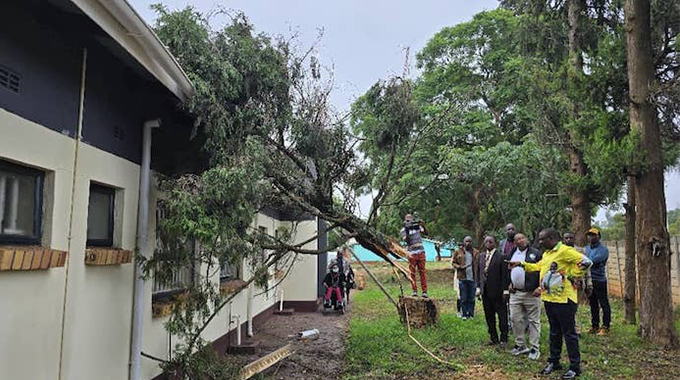Virtual courts come to Matabeleland

Thandeka Moyo-Ndlovu, Senior Reporter
PEOPLE in Matabeleland region will be able to access courts virtually starting on February 1 this year as part of efforts to enhance access to justice by the Judiciary Service Commission (JSC).

Judiciary Service Commission secretary Mr Walter Chikwana(left) addresses Lawyers on virtual courts at the Bulawayo High Court of Zimbabwe yesterday.
The virtual court system will digitise the Labour Court and the Administrative Courts housed in Bulawayo.
Dubbed the second phase of the Integrated Electronic Case Management System (IECMS), the virtual courts will address a number of challenges that hindered members of the public from easy and timely access to justice.
The IECMS system is a web-based Case Management System which automates and tracks all aspects of a case life cycle, from initial filing through disposition and appeal.
The system allows for information sharing between systems from all stakeholders in the judiciary.
In the future, the system will integrate with systems from organisations such as the Zimbabwe Republic Police, Zimbabwe Prisons and Correctional Services, Law Society of Zimbabwe, Attorney General’s Office, National Prosecuting Authority, Legal Aid Directorate and Zimbabwe Anti-Corruption Court.
This is in line with the Government’s policy to take the justice delivery system to the people in line with National Development Strategy 1 (NDS1).
Phase one of the IECMS which was launched last year benefitted prisoners only as the Magistrates Court started remanding cases virtually while the Commercial Court, Supreme Court and Constitutional Court heard trials virtually.
As a result, inmates at Khami Prison were able to follow court proceedings from the prison last year whenever the Zimbabwe Prisons and Correctional Services had challenges with fuel to transport them to respective courts.
Starting next month, besides allowing litigants to access court proceedings from the comfort of their homes, the system will also curb corruption within the judiciary as files and documents will be saved virtually and will not be easily tampered with. Bogus lawyers who also had been duping unsuspecting litigants will not be able to operate in Zimbabwean courts as the system brings an end to the manual filing of cases.
All lawyers will have to be registered through the Law Society of Zimbabwe to be able to access the IECMS.
In an interview after meeting judiciary stakeholders yesterday in Bulawayo, JSC secretary Mr Walter Chikwana said the second phase of IECMS will deal with a lot of challenges affecting service delivery within the sector.

Judiciary Service Commission secretary Mr Walter Chikwana(left) addresses Lawyers on virtual courts at the Bulawayo High Court of Zimbabwe yesterday.
“Today we had a meeting with all legal practitioners from Bulawayo to brief them on the forthcoming integrated electronic case management system in the Labour and in the Administrative Courts. You will appreciate that on May 1 2022, the JSC digitised the Constitutional Court, the Supreme Court and the Commercial Division of the High Court Under Phase One,” said Mr Chikwana.
“Now we are moving into phase two in which we have targeted the Labour court and then we will move into phase three targeting the general division of the High Court and the office of the Sheriff. So we were simply advising them that on the 1st of February 2023, with effect from then, they will not be able to, you will not be able to litigate in those three courts manually and they are required to familiarise themselves with the IECSM system.”
He said people anywhere in Matabeleland or Zimbabwe will have access to the courts virtually.

“The digitisation of the courts is a new thing that we are introducing in Zimbabwe. It’s the enhancement of access to justice, it will ensure that people are able to access a court from wherever they are. If one stays in Nkayi and wants to access the Labour Court, there won’t be a need to travel from Nkayi to Bulawayo to access the courts,” he said.
Mr Chikwana said those in need of the gadgets or data to access courts from their home areas will go to the nearest court as they will be connected for such purposes.
He said with the IECMS, magistrates, judges will be able to lead proceedings from their chambers and lawyers will have an option to attend court physically or do it from their offices.
In terms of filing cases or submitting documents, users of the IECMS will be able to save these online for easy access.
“The virtual courts will enhance justice and efficiency in our court system because matters that are filed will be dealt with instantly. This system will remove the human element that may interfere with processes. It also deals with perennial issues of corruption as we have had serious problems with missing files and documents,” he said.
He also added that in the past some matters would fall off the system without explanation hence the digitising of the courts will help curb that anomaly.
“With IECMS you can never miss a document or a file because they are in soft copy. If you make attempts to delete something we have backup systems which will ensure that all the backup systems of the file are readily available. We have been told of bogus lawyers now a bogus lawyer cannot file or litigate if they are not in the system.” — @thamamoe.












Comments